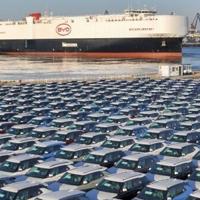The European Union has issued a warning to potentially impose additional tariffs of up to 38 percent on Chinese electric car imports starting next month after an anti-subsidy probe. This decision has raised concerns about a trade war.
Last year, Brussels initiated the probe in an effort to protect European manufacturers, causing tension with China. Hours before the announcement, Beijing cautioned that such action would be detrimental to Europe’s interests.
There is disagreement within the EU as well, notably from Germany, a significant trade partner with China, which believes that the tariffs will negatively impact German companies.
The European Commission has now instructed for provisional tariff increases on specific Chinese manufacturers: 17.4 percent for BYD, 20 percent for Geely, and 38.1 percent for SAIC.
The commission stated that these amounts are based on the level of state subsidies received by the companies.
In addition, other Chinese electric car producers who cooperated with the probe but were not sampled will face an average duty of 21 percent, while non-cooperating BEV producers will be subject to a 38.1 percent duty on top of the existing 10 percent tariff.
To avoid the implementation of extra tariffs, Beijing and Brussels need to address the issue of subsidies.
The Commission expressed that the unfair subsidization in the Chinese battery electric vehicles (BEV) value chain poses a threat of economic injury to EU BEV producers. If discussions with Chinese authorities fail to produce an effective solution, these provisional countervailing duties will be imposed.
The tariffs are set to apply provisionally from July 4 and definitively from November unless a qualified majority of EU states disagree with the move.
Before the announcement, China criticized the tariffs as an act of protectionism that goes against market economy principles and international trade rules. The country expressed its intent to protect its rights and interests.
– China warning –
The European Commission initiated the probe last year to address what they perceived as unfair practices undermining Europe’s car manufacturers. While the EU’s tariffs are relatively high, they are lower compared to the United States’ 100 percent rate imposed on Chinese electric cars in the previous month.
Not all EU member states support the commission’s decision. Countries like Germany, Hungary, and Sweden have expressed reservations about the investigation and the proposed higher duties.
China is a significant market for German car manufacturers, and Hungary, which recently hosted Chinese President Xi Jinping, is preparing for a BYD factory construction. Geely, which owns Volvo, is based in Sweden.
The Chinese Chamber of Commerce to the EU criticized the announced rates as a barrier to the market, driven by protectionism and politically motivated investigations.
Chinese media also hinted at retaliatory measures such as targeting EU exports like pork and dairy products. This could have severe repercussions on European exports as China is a key market for EU agriculture products.
Overall, the situation between the EU and China reflects escalating tensions and potential economic repercussions for both sides.





